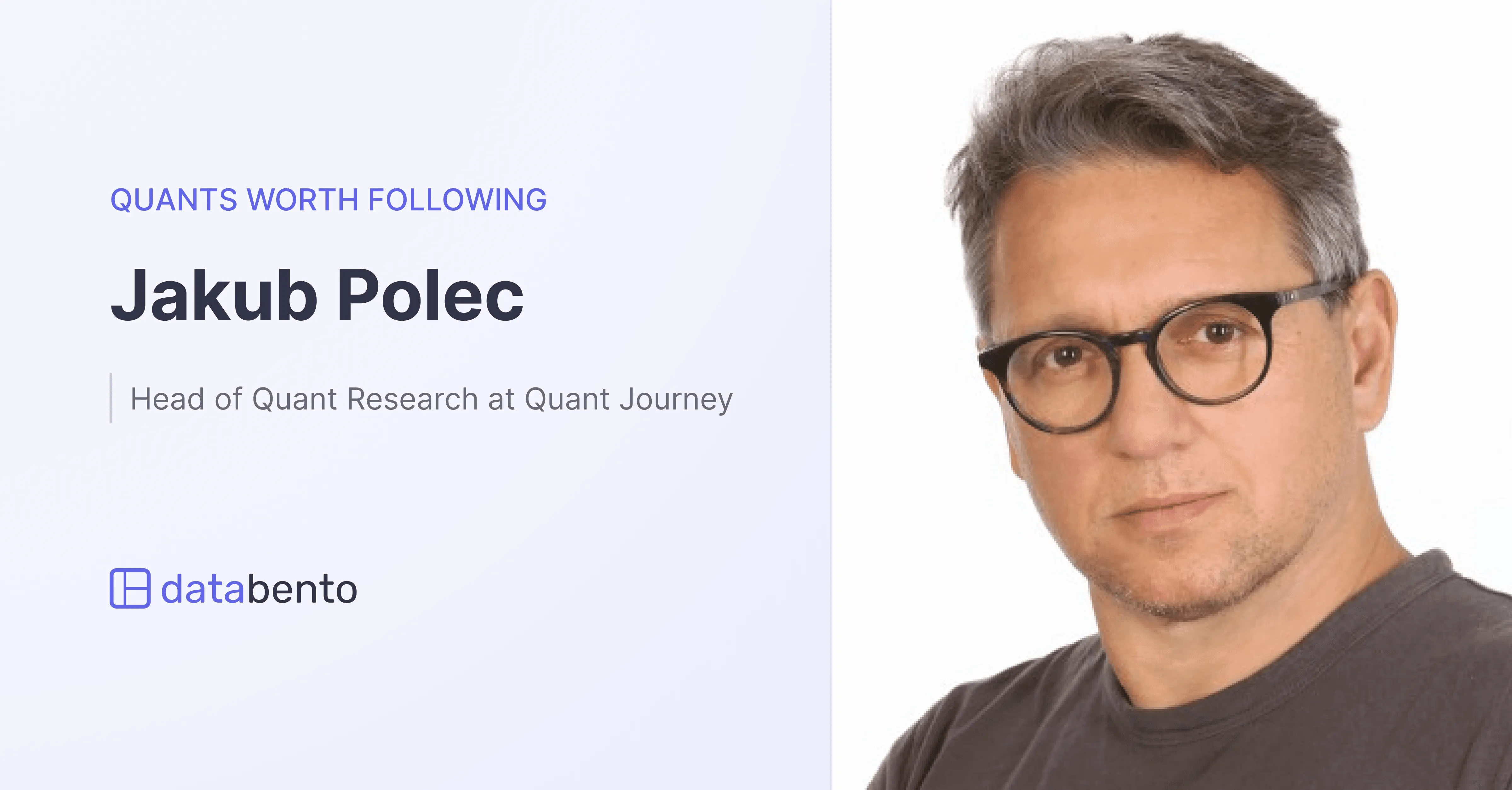Quants worth following: Jakub Polec

“If you follow others, you’ll probably lose the game. It’s the same in quant as it is in physics: once something is discovered, the goal isn’t to repeat it—it’s to improve it, challenge it, or build on it.”
"Quants worth following" is our latest interview series highlighting thought leaders in the quantitative trading industry who actively share their knowledge and resources with the community.
This week, we spoke with Jakub Polec, a CERN physicist turned quant entrepreneur. From analyzing particle collisions to launching AI infrastructure startups long before the buzz, Jakub brings a rare blend of scientific precision and startup execution to quant finance.
After studying physics at Warsaw University, he earned a scholarship to Amsterdam and went on to join CERN, where he worked on high-energy experiments and large-scale data analysis. He later moved into tech with roles at Microsoft and Oracle before pivoting into quant in 2020.
Today, he co-runs New Horizons Asset Management and leads Quant Journey, a company building AI infrastructure for systematic traders, both individual and institutional. In this conversation, Jakub shares what he’s learned across physics, big tech, and entrepreneurship—and how those experiences continue to shape his approach to trading and innovation.
Jakub’s transition to quant finance was a natural extension of his physics background and analytical mindset. During his time at CERN, he gained early exposure to the kind of scale and complexity that would later define his work in finance:
“I was exposed to massive datasets from the very beginning, working with high-performance computing and large-scale computational and storage systems. We distributed the computational jobs, used HPC, and various low-frequency hardware and software systems. Basically, as physicists, what we do is observe the world and look for patterns in it.”
That same approach—extracting structure from complexity—proved essential in modeling markets, often using the same mathematical tools applied in physics.
Before fully committing to quant, Jakub worked at Microsoft and Oracle and launched several startups. One of them, 15 years ahead of its time, tackled what we now call generative AI:
“We were extracting meaning from unstructured e-commerce texts and reconstructing product descriptions algorithmically, applying ML models.”
His work across physics, big tech, and early AI laid the foundation for what he’s building today: AI infrastructure for the next generation of quants.
Jakub emphasizes that in both physics and quantitative finance, real progress doesn’t come from following the crowd, but from continually pushing into new territory. It’s a mindset of experimentation and iteration that has shaped his career from the start:
“If you follow others, you’ll probably lose the game. It’s the same in quant as it is in physics: once something is discovered, the goal isn’t to repeat it—it’s to improve it, challenge it, or build on it.”
He approaches quant research the same way: as a constant process of refining models, testing ideas, and staying mentally flexible.
“These are lessons you don’t learn in a classroom. They come from life experience, and nothing can replace that.”
Jakub saw firsthand how technological shifts reshaped both enterprise software and, later, finance. At Oracle and Microsoft, even the biggest players were often experimenting in real time, unsure where innovation would lead.
One of the most pivotal transitions was the shift from on-premise to cloud infrastructure:
“It changed everything—not just how software is delivered, but how fast you can iterate and innovate.”
He sees the same dynamic in quant finance today. Speed, adaptability, and constant iteration are no longer advantages—they’re essentials.
“Innovation is the key element. If you’re not building something new, you’re already behind.”
Jakub’s path into quant research began years before machine learning and data science became buzzwords. Early on, he focused on the technical backbone of quant work—building infrastructure and developing models to support research and execution:
“I was behind the scenes, doing whatever it took to make things run. At some point, I decided to stop building systems only for others and start doing it for myself.”
Around four years ago, he launched a fund and co-founded Quant Journey, a company focused on building AI infrastructure for systematic traders. Today, his team supports hedge funds, prop firms, and family offices with tools to research, backtest, and deploy strategies at scale, blending his background in physics, AI, and entrepreneurship into a platform built for modern quant teams.
“We still have a lot ahead of us, but helping other traders is something that truly motivates us.”
For Jakub, entrepreneurship is defined by uncertainty and constant adaptation. One of the hardest parts, he says, is confronting the unknown while trying to move forward:
“You don’t know what you don’t know. Things rarely go as planned—you start with a vision, but the reality is far messier. You have to be mentally flexible, ready to pivot, and willing to act even when the path isn’t clear. Everyone talks about big ideas, but it’s action and persistence that really drive success.”
That mindset shapes how he leads Quant Journey—balancing innovation with execution, and viewing every challenge as a chance to learn and refine.
Jakub offers clear guidance for those starting out in quant finance or building a company:
“Master the basics—without them, you’ll end up with nothing. But more than that, you need passion. It has to come from within. Build your own tools early, protect your independence, and find your own style. Don’t just follow others—create your own path and improve every day. That consistency, that drive to get a little better each day, is what brings you closer to success.”
Check out the full interview on our YouTube here.